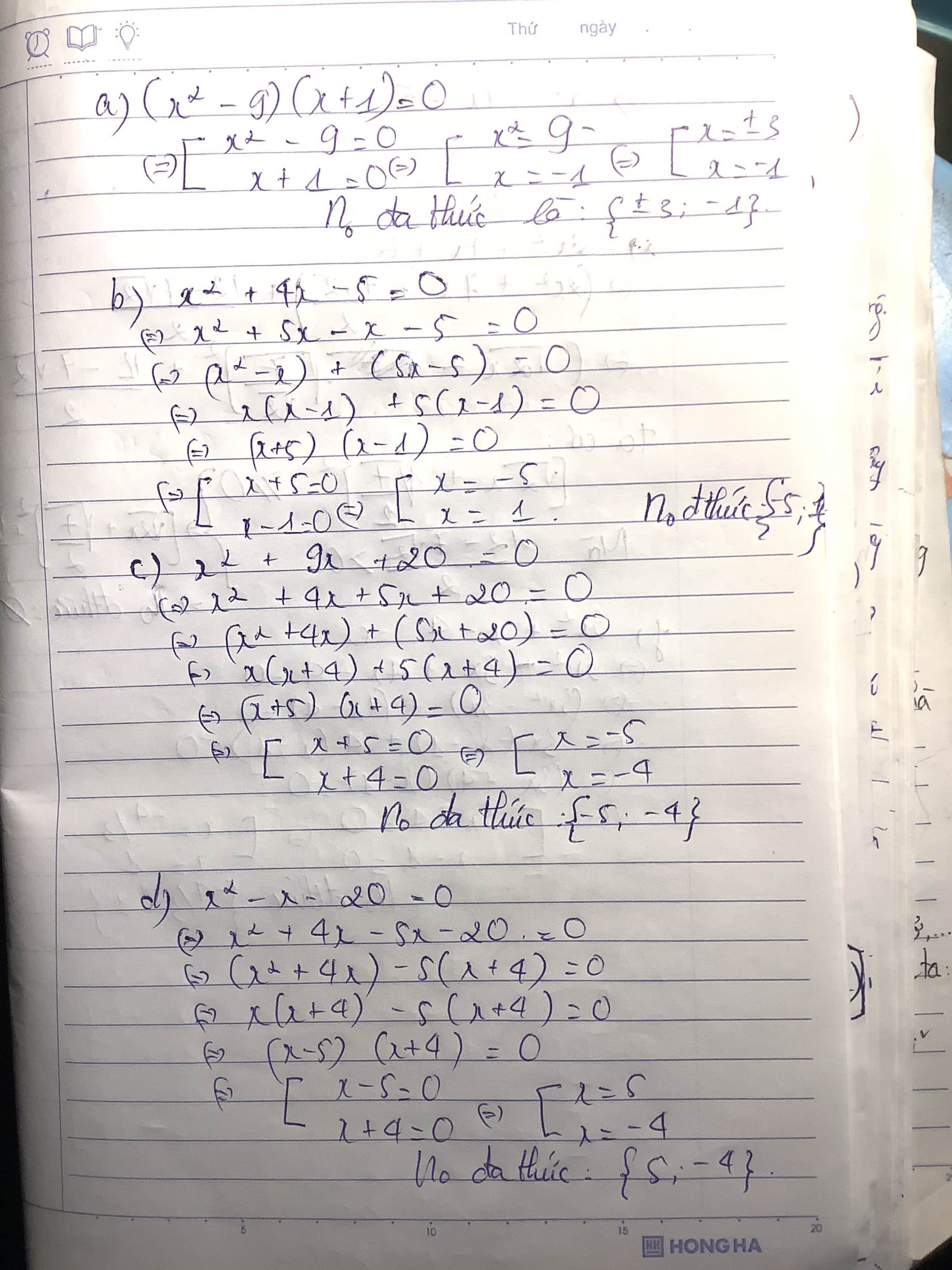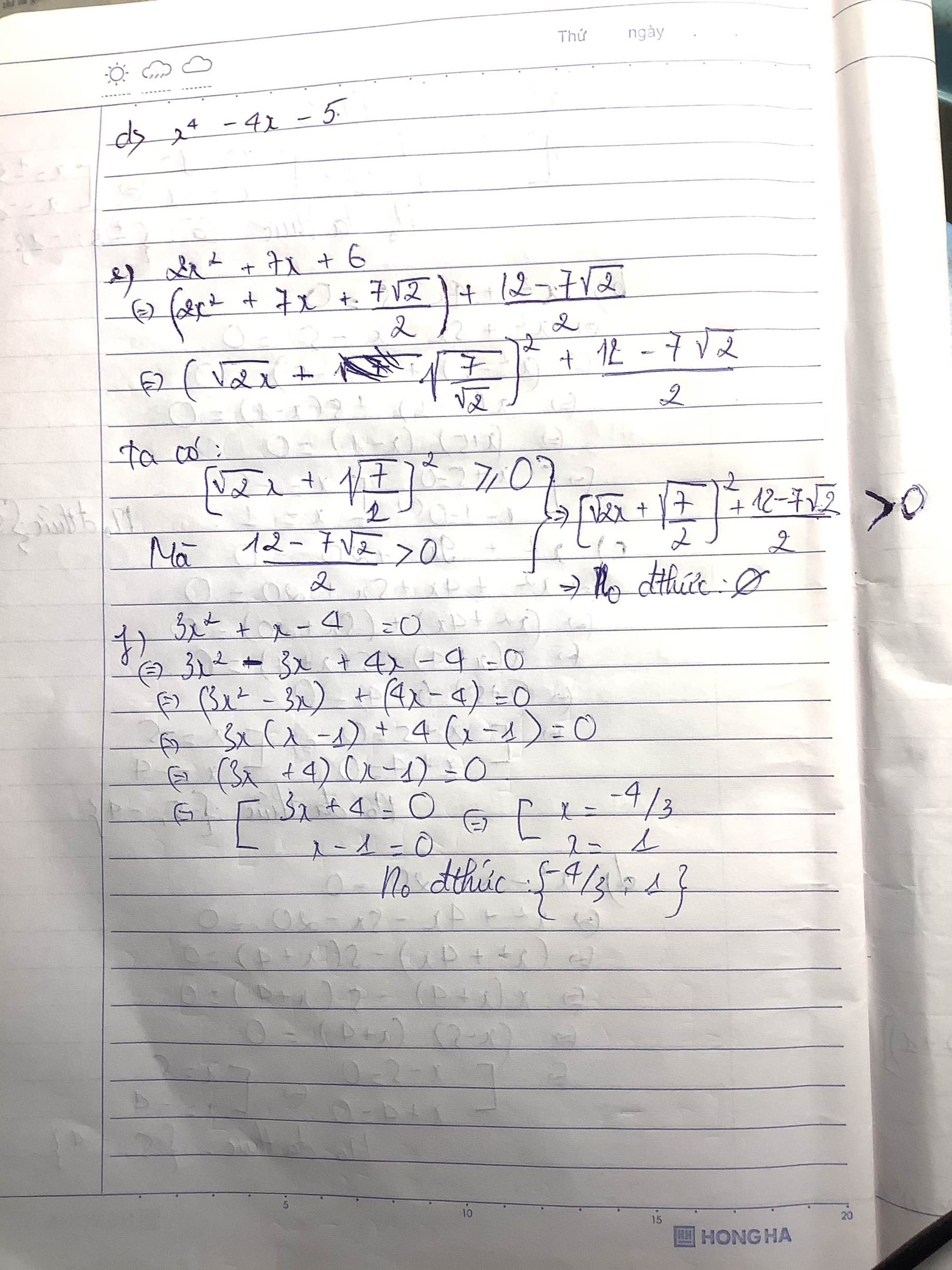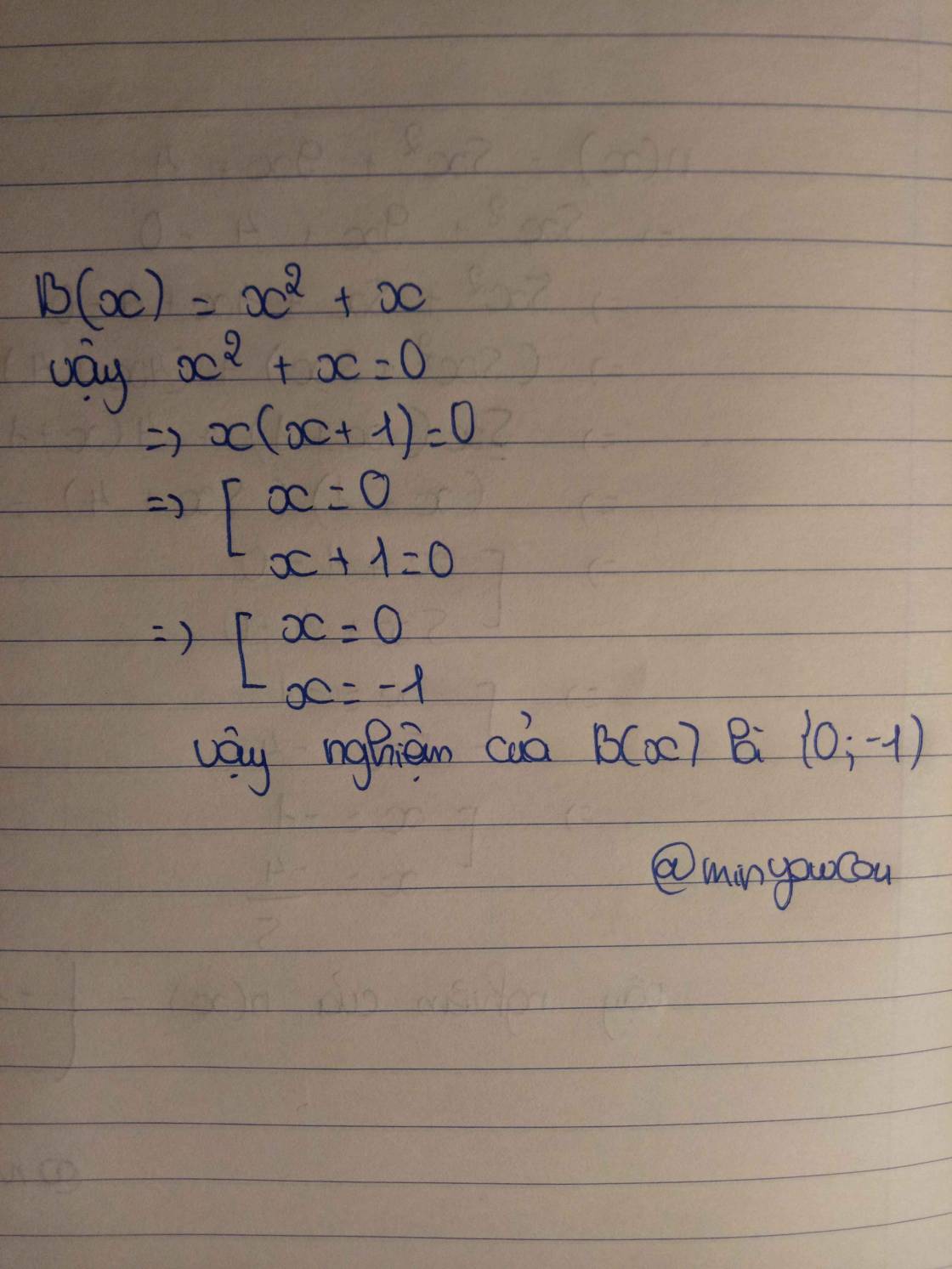
Hãy nhập câu hỏi của bạn vào đây, nếu là tài khoản VIP, bạn sẽ được ưu tiên trả lời.


\(a,x^2-2=0\Leftrightarrow x^2-\left(\sqrt{2}\right)^2=0\Leftrightarrow\left(x-\sqrt{2}\right)\left(x+\sqrt{2}\right)=0\Leftrightarrow\left[{}\begin{matrix}x=\sqrt{2}\\x=-\sqrt{2}\end{matrix}\right.\)
Vậy \(S=\left\{-\sqrt{2};\sqrt{2}\right\}\)
\(b,x\left(x-2\right)=0\Leftrightarrow\left[{}\begin{matrix}x=0\\x=2\end{matrix}\right.\)
Vậy \(S=\left\{0;2\right\}\)
\(c,x^2-2x=0\Leftrightarrow x\left(x-2\right)\) phương trình như câu b,
\(d,x\left(x^2+1\right)\Leftrightarrow\left[{}\begin{matrix}x=0\\x^2+1=0\end{matrix}\right.\Leftrightarrow\left[{}\begin{matrix}x=0\\x^2=-1\left(voli\right)\end{matrix}\right.\)( voli là vô lí )
Vậy \(S=\left\{0\right\}\)

a) \(\left(x-1\right)\left(x+5\right)=0\Rightarrow\left[{}\begin{matrix}x-1=0\\x+5=0\end{matrix}\right.\)\(\Leftrightarrow\left[{}\begin{matrix}x=1\\x=-5\end{matrix}\right.\)
b) \(x+1x^2+1=x^2+x+1=x^2+2.\dfrac{1}{2}x+\dfrac{1}{4}+\dfrac{3}{4}=\left(x+\dfrac{1}{2}\right)^2+\dfrac{3}{4}\ge\dfrac{3}{4}>0\)với mọi x.
=> Pt vô nghiệm.
c) \(x^2+4x=0\Leftrightarrow x\left(x+4\right)=0\Leftrightarrow\left[{}\begin{matrix}x=0\\x+4=0\end{matrix}\right.\)\(\Leftrightarrow\left[{}\begin{matrix}x=0\\x=-4\end{matrix}\right.\)
P/s: Check lại đề ý b nhé.
a) Ta có:(x-1)(x+5)=0
\(\Leftrightarrow\left[{}\begin{matrix}x-1=0\\x+5=0\end{matrix}\right.\Leftrightarrow\left[{}\begin{matrix}x=1\\x=-5\end{matrix}\right.\)
Vậy: S={1;-5}
b) Ta có: \(x^2+x+1=0\)
\(\Leftrightarrow x^2+2\cdot x\cdot\dfrac{1}{2}+\dfrac{1}{4}+\dfrac{3}{4}=0\)
\(\Leftrightarrow\left(x+\dfrac{1}{2}\right)^2+\dfrac{3}{4}=0\)(Vô lý)
Vậy: \(S=\varnothing\)
c) Ta có: \(x^2+4x=0\)
\(\Leftrightarrow x\left(x+4\right)=0\)
\(\Leftrightarrow\left[{}\begin{matrix}x=0\\x+4=0\end{matrix}\right.\Leftrightarrow\left[{}\begin{matrix}x=0\\x=-4\end{matrix}\right.\)
Vậy: S={0;-4}

`x^2-x+1/4=0`
`<=>x^2-1/2x-1/2x+1/4=0`
`<=>x(x-1/2)-1/2(x-1/2)=0`
`<=>(x-1/2)^2=0`
`<=>x=1/2`
Vậy nghiệm là `1/2`

B(x) = x2+x
Đặt B(x) = 0
=> x2+x=0
x.x + x = 0
x(x+1)=0
TH1: x = 0
TH2: x+1 = 0
x = -1
Vậy nghiệm của B(x) là x=-1

a/ \(M\left(x\right)=-x^2+5\)
Có \(-x^2\le0\forall x\)
=> \(M\left(x\right)\le5\forall x\)
=> M(x) không có nghiệm.
2/
Thay \(x=\dfrac{1}{2}\) vào đa thức M(x) có
\(M\left(\dfrac{1}{2}\right)=\dfrac{1}{4}a+\dfrac{5}{2}-3=0\)
\(\Leftrightarrow\dfrac{1}{4}a=\dfrac{1}{2}\)
\(\Leftrightarrow a=2\)
Vậy...

Lời giải:
1.
$4x+9=0$
$4x=-9$
$x=\frac{-9}{4}$
2.
$-5x+6=0$
$-5x=-6$
$x=\frac{6}{5}$
3.
$x^2-1=0$
$x^2=1=1^2=(-1)^2$
$x=\pm 1$
4.
$x^2-9=0$
$x^2=9=3^2=(-3)^2$
$x=\pm 3$
5.
$x^2-x=0$
$x(x-1)=0$
$x=0$ hoặc $x-1=0$
$x=0$ hoặc $x=1$
6.
$x^2-2x=0$
$x(x-2)=0$
$x=0$ hoặc $x-2=0$
$x=0$ hoặc $x=2$
7.
$x^2-3x=0$
$x(x-3)=0$
$x=0$ hoặc $x-3=0$
$x=0$ hoặc $x=3$
8.
$3x^2-4x=0$
$x(3x-4)=0$
$x=0$ hoặc $3x-4=0$
$x=0$ hoặc $x=\frac{4}{3}$

Đặt \(B\left(x\right)=0\)
\(\Rightarrow-x^2+16=0\)
\(\Rightarrow-x^2=-16\)
\(\Rightarrow x^2=16\)
\(\Rightarrow x=\pm\sqrt{16}\)
\(\Rightarrow x=\pm4\)
Vậy \(x=\pm4\) là nghiệm của đa thức



Ta có \(x+x^2=0\Rightarrow x\left(x+1\right)=0\)
\(\Rightarrow x=0\) hoặc \(x+1=0\)
\(\left(+\right)x=0\)
\(\left(+\right)x+1=0\Rightarrow x=-1\)
Vậy nghiệm của \(x+x^2\) là 0 và 1
\(x\left(x+1\right)=0\)
\(\Rightarrow x=0;x=-1\)
Vậy tập nghiệm là